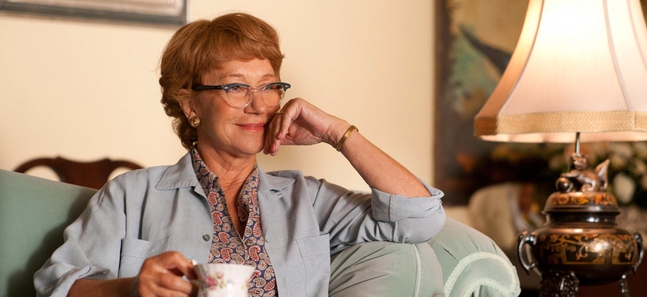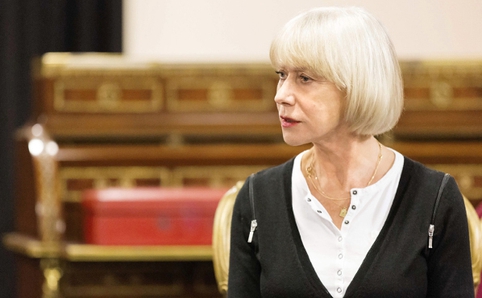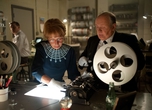Helen Mirren: the interview
The beloved Dame talks about sex tapes, feminism and playing the Queen

© 2012 Twentieth Century Fox. All Rights Reserved.
Posted: Mon Apr 01 2013
High above Freddie Mercury’s giant gold pumping fist, in a bitterly cold box room tucked under the roof of the Dominion Theatre, a 67-year-old woman shivers, reaches for her soup and says: ‘Honestly, I’m sure we’ll warm up soon.’ For a woman who was getting rave reviews as long ago as 1966, she’s something of a trouper. She is Helen Mirren, an actress whose looks regularly provide newspaper editors with still-got-it-after-all-these-years headlines, whose dress and shoe choices fuel a thousand celeb webpages and who has long been acclaimed as the sexiest Englishwoman alive. I mention this. ‘Well,’ she admits between spoonfuls, ‘I do try.’
Today, though, it looks pretty effortless. Silvery-blonde hair in a long bob, tangled gold chain thrown around her neck, a tailored-to-her-curves purple dress, sheepskin coat and woollen scarf around her shoulders: it’s all artfully casual, yet the overall effect brings, despite the hint of cream of mushroom in the air, an enticing frisson to the gloomy Tottenham Court Road theatre. Rather than an unexpected turn in We Will Rock You, Mirren is here for another queen, rehearsing for Peter Morgan’s The Audience, which sees her return as Elizabeth II, the role she made her own in his 2006 film The Queen. It coincides with the release of Hitchcock, an American movie paying off-kilter tribute to that master filmmaker’s art.
Morgan has enticed Mirren back with a script that focuses on the Queen’s weekly meeting with her prime minister. ‘It was kind of a mistake to say yes to him,’ Mirren says ruefully. ‘Because you don’t want to go backwards, but I knew I couldn’t resist. I was pissed off when he wrote it. I emailed him and said, “You bastard!”.’ The original film is set during the period following the death of Princess Diana, which was – the Blitz aside – the royal family’s lowest ebb since Edward VIII’s 1936 abdication, and certainly its biggest PR disaster. ‘It was quite a radical idea,’ Mirren recalls with a slight shudder, which might be the cold or memory of a fear of failure, a subject she will also return to. ‘I thought we could be ripped apart; it scared me. You don’t know if it’s going to work.’
It did work, and her portrayal of a monarch knee-deep in an ‘annus horribilis’ won Mirren a Best Actress Oscar. Since then, roles and awards have kept coming, and she has just returned from unveiling her star on Hollywood Boulevard. ‘I enjoyed it inordinately,’ she gushes. ‘Twenty years ago Hollywood Boulevard was drug dealers and hookers: frightening and very unglamorous, but there were still the stars and the handprints. I never ever imagined I’d be that kind of actress, although I was that kind of actress.’ So she didn’t set out to be a Hollywood star? ‘No, it just kind of happened. It’s inexplicable, really.’
Perhaps not inexplicable but, despite her great talent, certainly unlikely. For the first part of her career Mirren was a seductive but very serious actress, whose performances in films such as Peter Greenaway’s The Cook, The Thief, His Wife & Her Lover were heavy on intellect as well as sex appeal. She went on to hold the nation in her grip as an eventually alcoholic police officer in TV’s Prime Suspect and become the regular choice for film directors who knew her presence would lend dignity to almost any offering. Her lauded lead in Tom Hooper’s 2005 Elizabeth I brought her an Emmy, but it was her second Elizabeth that made her the world star, revelling in the paradox of being a highbrow stage actress who also turns out for Bruce Willis’s Red movies. Though she has split her life between LA and London for 20 years, the Chiswick-born Mirren remains protective of the land that made her (‘A brilliant, great, inventive, argumentative, eccentric, imaginative country’). But in her sparkling elegance she is more obviously a creature of LA, so all the better placed to understand Alma, the Hollywood wife she plays alongside Anthony Hopkins in Hitchcock.
For Mirren the film is in part about the ‘the difficulties of marriage’, the main difficulty for Alma being Hitchcock’s interest in his female lead, Janet Leigh, played by Scarlett Johansson. Did directors pester the younger Mirren? ‘I was never that kind of star. I was never cast because I was gorgeous…’ There’s a pause during which I might raise an eyebrow, before she finishes the sentence: ‘…I don’t think.’ The film is also about recognising the off-screen roles of women in Hollywood.
When he and Alma drift apart, Hitchcock is unable to complete Psycho, the shocking thriller that will cement his reputation. ‘Alma is vital to his work,’ Mirren notes. ‘But that’s not unusual in the film world. A lot of film editors are female. Scorsese’s editor is a woman. Tarantino’s editor is a woman. But men write women’s contribution out of history.’ Why? ‘Because women muddy things. It’s much cleaner and clearer to say, “Here’s Hitchcock, the great visionary.” If this woman comes in, it messes that up. But there’s been a huge shift. When I started, the only woman on set would be the script person or the costume person.’
When I ask if she signed up for feminism she’s suddenly cross: ‘I didn’t “sign up”!’ she barks. ‘For me feminism is just fucking obvious. It is not an ideological or a political thing. We’re half the population. I don’t even see it as a cause: it’s just fucking obvious!’ But she did once have a reputation for being radical, one of the less laughable thespian left-wingers. ‘I was never a left-winger, actually,’ she says. ‘I was a pretend left-winger because it was more interesting than being a right-winger. I never really embraced the ideology, because socialists were so sexist and racist. Not the ones I hung out with, but the unions. The printers’ union: no blacks in the printers’ union; no women in the printers’ union. They were all “Up with the workers!” Yeah, but only this lot of workers. I felt very uncomfortable with all of that.’
 Helen Mirren in 2013: ‘For me feminism is just fucking obvious. It is not an ideological or a political thing. We’re half the population!’
Helen Mirren in 2013: ‘For me feminism is just fucking obvious. It is not an ideological or a political thing. We’re half the population!’
Mirren looks back with a similarly cold eye on the arrival of sexually liberated theatre in the 1970s. ‘Certain shows were unbelievably sexual,’ she recalls. ‘Especially in the early days of performance art and theatre coming together: very radical, explicit stuff. I was shocked at what people were doing on stage.’ Yet the young Mirren did well from the loosening of sexual mores: it took her to Hollywood, after all. Though perhaps its legacy has left today’s young women in the sweaty grip of what feminist critics – and Labour MP Diane Abbott – have called the ‘pornification’ of society.
‘That idea of sex being high art has moved into people making sex tapes,’ says Mirren. ‘Which seems to be a passport to fame and fortune. You just have to have a sex tape of yourself illicitly released and you’re going to make a fortune. The way society moves – I don’t think you can control that. Sixteen-year-old girls aren’t going to listen to Diane Abbott, are they? It’ll just roll on and something else will appear. The 16-year-olds will grow older and think: That was weird, I’m not doing that any more.’
So Mirren doesn’t feel that younger women are oppressed by sex now? ‘In a way, but I wonder if it was more of an instrument of oppression when it was, “Nice girls don’t do that”? You know, you were a slut if you showed your bra. So I’m not horrified by girls behaving the way boys used to.’
I sense that she’s not horrified by much right now, her mind being utterly focused on work. She agrees: ‘When I’m doing theatre, that becomes the centre of the universe. Everything else falls away – it’s the most important thing in the world!’ Is that liberating? ‘No, it’s not liberating. It’s awful. It’s just so frightening.’
After all these years? ‘Yes. It’s fear of failure. I’ve been in a lot of failures. Having suffered the slings and arrows of outrageous criticism in the past, knowing I’ll carry all the scars forever.’ The arrows don’t bounce off, then? ‘No. They go deep. But it’s like boxing: the point is getting up again. Maybe not win, but at least get back up again.’
It’s been some time since the critics knocked Mirren down: these days everyone tells her how great she is. When they were given victory parades, Roman generals would have a slave on the chariot whispering, ‘Remember you are mortal.’ Does she have a similar device for award presentations? She raises her voice again: ‘I know that I am mortal! Absolutely, deeply, profoundly mortal. I have no problem with that!’
But she recognises the dangers: ‘If you start believing that stuff, working it into your persona, it stops you challenging and questioning yourself.’ Would the younger Mirren be entirely content with this? ‘No, she would be cross. She would feel that I had sold out for doing things like Red II. She would have disapproved of that sort of commercial Hollywood. But she wouldn’t have called me a sellout for playing the Queen.’
It’s hard to think of a tougher role for such an alluring and intelligent actress. ‘I don’t think that [the Royal family] aren’t intelligent,’ she says. ‘It’s like looking at a farmer in Yorkshire and thinking: Does he know about the latest play at the National Theatre? They’re culturally very different: different mindset, different priorities. The great thing about playing the Queen is there’s no vanity there, no, “What will they think of me?” It’s absolutely, “I’m the Queen, you’ll take me as I am and that’s all you’re getting.” An absolute refusal to ingratiate, charm, manipulate. When I am playing Elizabeth I, I put on an Elizabeth I costume. It’s the same thing; she puts on her Elizabeth II costume for the show and the show is all day, every day.’
It’s not very beguiling, though, is it? ‘But she was beautiful! That coronation dress: I’ve watched that again and again. It was absolutely beautiful. Oh my God!’ Mirren runs her hands briefly down her boobs and hips to indicate the royal arrangements: ‘Very sexy!’ And, suddenly, it really is quite warm in here.
Hitchcock is released nationwide on April 5. This article originally appeared in Time Out London
Tweets
- About Us |
- Work for Time Out |
- Send us info |
- Advertising |
- Mobile edition |
- Terms & Conditions |
- Privacy policy |
- Contact Us
Copyright © 2014 Time Out Tokyo














Add your comment